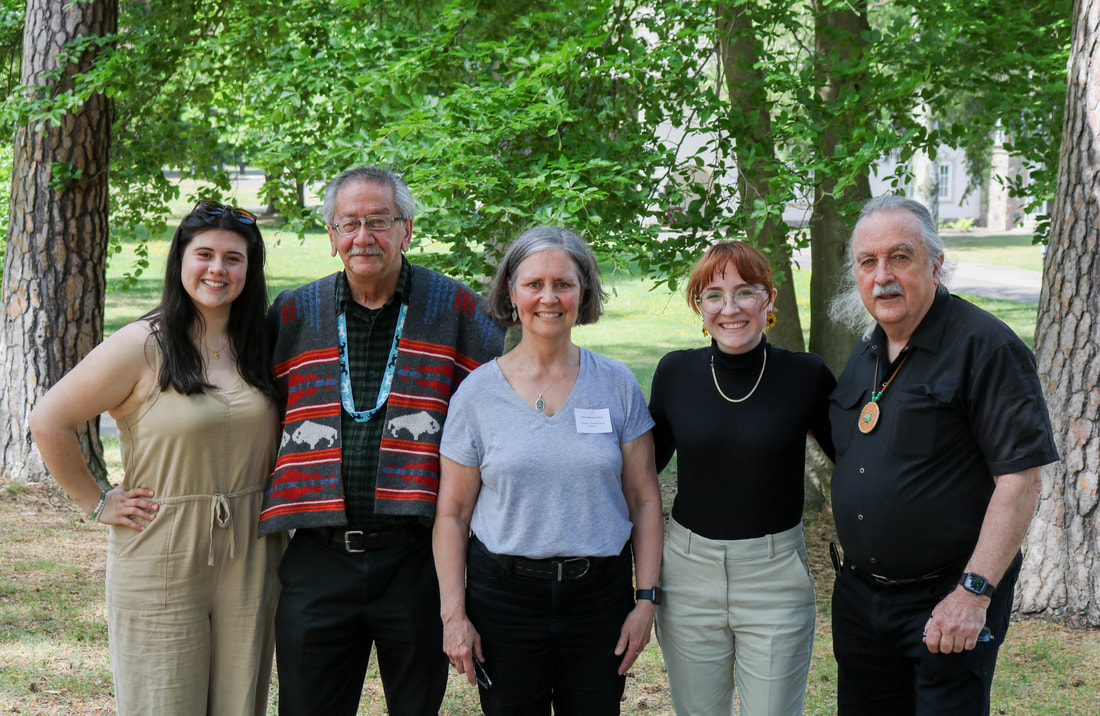 From left to right: Conservation Coordinator for the Fundy Biosphere Clarissa Hoffman, Special Advisor for the Mistawasis Nêhiyawak Anthony Johnston, UNESCO Chair in Biocultural Diversity, Sustainability, Reconciliation and Renewal Assistant Director at University of Saskatchewan Maureen Reed, Events and Logistics Coordinator for the Fundy Biosphere Raven Nixon, and Executive Director of Plenty Canada Larry McDermott at the Germany Biosphere Reserves Conference. Plenty Canada is proud to have been given the opportunity to send a representative, Executive Director Larry McDermott, to the international conference entitled Scientific Research In, For, and With the UNESCO Biosphere Reserves. The conference was held in Eberswalde, Germany from May 16th to 20th, and was hosted by the Biosphere Reserve Institute (BRI), an institution of the Eberswalde University for Sustainable Development. It was an honour for Plenty Canada to have been able to field a representative who testified to the importance of Indigenous knowledge when dealing with climate-related issues.
The Institute was established in 2019, and conducts research, trains staff, and educates students with the goal of “supporting biosphere reserves in their transition towards being model regions for sustainable development.” Specifically, this means ensuring that biospheres follow the measures laid out by the 2016 Lima Action Plan, such as responsible production and consumption, diverse land and water life, etc. (BRI). Lofty goals such as these require careful consideration and research, of course, which is why the Eberswalde conference was created to be a dedicated forum for sharing strategies. The conference aimed to discuss the current research being conducted related to biosphere reserves and to lay out the best approaches for fostering research and innovation within biospheres. To summarize, this conference was an important session delving with the future direction of biosphere reserves, areas of diverse flora and fauna that will become even more valuable as climate change begins to take its course. The conference included the voices of Indigenous peoples, whose historical understandings of their natural environments and proposed solutions for environmental degradation act as perfect compliments to the Western science practices of the Institute. At the beginning of the conference Larry, was invited to host a smudge ceremony, opening the ceremony with a spirit of gratitude and mindfulness. He was also given the opportunity to speak on a few key subjects, specifically the importance of Indigenous knowledge with regard to sustainable development, and how this knowledge can complement rather than compete with Western modes of thought — in other words, the concept of “Two-Eyed Seeing” that has been promoted a number of times within Plenty Canada Contact newsletters. The attendees of the conference were quite receptive to these ideas, and overall, Larry found the conference to be productive. Indigenous perspectives are becoming more common in professional conversations about the climate crisis. As a policy-maker with decades of experience, Larry consistently advocates for the practice of Two Eyed-Seeing. Despite the apathy of many of the world's governments, scientists and Indigenous peoples all around the world are taking the fight against climate change into their own hands, with the hope and expectation that damaging trends can be mitigated. — Breton Campbell
0 Comments
Your comment will be posted after it is approved.
Leave a Reply. |
|
-
Home
- Donate
-
Projects
-
Canada
>
- Plenty Canada CampUs
- The Healing Places
- Two-Eyed Seeing Bird Knowledge
- Niagara Escarpment Biosphere Network
- Greenbelt Indigenous Botanical Survey
- Great Niagara Escarpment Indigenous Cultural Map
- Ginawaydaganuc Indigenous Food Sovereignty
- Indigenous Languages and Cultures Programs >
- Wild Rice
- Good Mind Grappling (partnership)
- Ginawaydaganuc Village (partnership)
- Youth Programming >
- Americas >
- Africa >
-
Canada
>
- News
- Resources
- Partners
- Contact Us
Our Location266 Plenty Lane Lanark, Ontario Canada K0G 1K0 (613) 278-2215 |
Donate to
|
Subscribe to our Newsletter |
